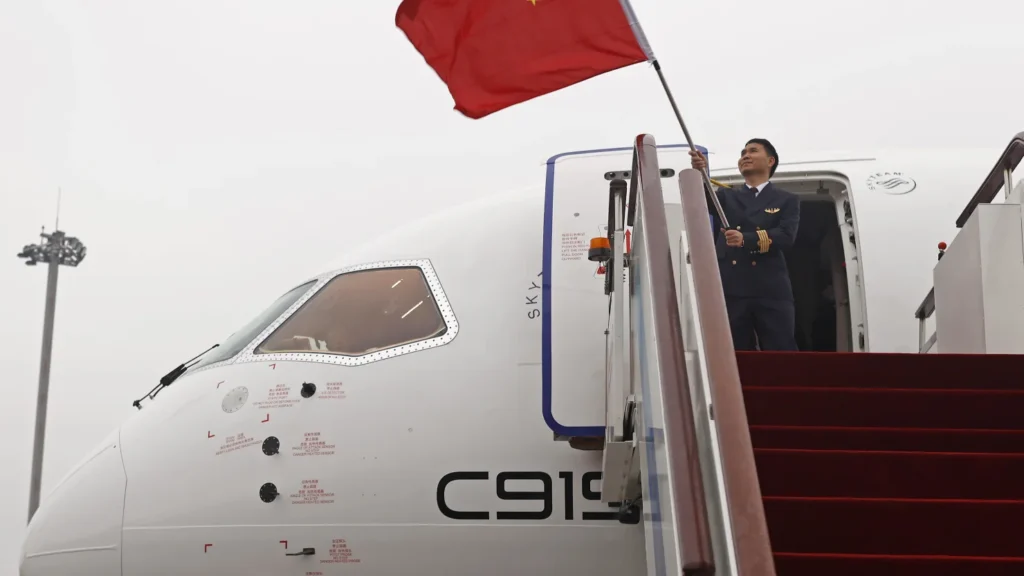In recent geopolitical developments, tensions between the United States and China have escalated significantly. One major point of friction is China’s recent decision to halt the export of critical materials, including rare earth metals and magnets, to the U.S. This move has the potential to disrupt several high-tech industries in the United States, including aerospace, semiconductors, electric vehicles, and defense.
This article explores the implications of China’s export restrictions, the impact on Boeing and the broader aviation industry, and how India might stand to gain from this evolving situation.

China News Service | China News Service | Getty Images
China’s Strategic Export Ban
China plays a dominant role in the global supply of rare earth elements and related strategic metals. These materials are essential for manufacturing:
- Weapons and defense equipment
- Electronics and semiconductors
- Electric motors and batteries (especially for EVs)
- Drones, robots, and aerospace components
By halting exports to the U.S., China is aiming to assert its leverage in ongoing trade and technology disputes. This calculated move is expected to create considerable difficulties for American manufacturers who heavily depend on these imports.
Boeing vs China: Aircraft Deliveries in Limbo
Adding to the strain, China has suspended the delivery of Boeing aircraft — a move that significantly affects one of America’s most important aerospace companies. The suspension is believed to be a response to heightened trade restrictions and security concerns between the two countries.
In total, Boeing was set to deliver around 130 aircraft to Chinese airlines. Now, those deliveries are on hold. Although this doesn’t bring China’s aviation sector to a halt, it does signal a major shift in supplier preference.

Boeing’s Strategy Moving Forward
Boeing is expected to respond with strategic lobbying efforts, especially under the influence of the Trump administration. The goals would be:
- Tariff adjustments through diplomatic negotiations.
- Resumption of aircraft deliveries to China under a special exemption.
- Diversification of markets, with a stronger focus on:
- India
- Middle East
- Latin America
These regions offer growing aviation markets and represent potential growth areas for Boeing’s commercial business.
China’s Backup Plan: Diversification and Self-Reliance
On the other hand, China is not short of options:
- It may shift future aircraft orders to Airbus, based in Europe.
- It can ramp up production with its own domestic manufacturer, COMAC (Commercial Aircraft Corporation of China), aiming to strengthen self-reliance.
This trend toward diversification reflects China’s long-term goal to reduce dependence on Western aerospace technology.

India’s Opportunity: A New Aviation Powerhouse?
As the U.S.-China standoff unfolds, India may quietly emerge as a major beneficiary.
A Comparison of Aviation Sectors:
- China: 67 airlines with a fleet size of 4,128 operational aircraft
- India: 22 airlines with about 740 operational aircraft
While China’s aviation market is nearly five times larger, India is rapidly expanding.
India’s Mega Aircraft Orders:
- Indian carriers (e.g., Air India, IndiGo) have placed orders for over 500 aircraft.
- If China cancels Boeing deliveries, India could move up the queue, potentially receiving aircraft sooner than expected.
This would help India meet its increasing domestic and international demand for air travel and strengthen its position in the global aviation market.
Conclusion
The suspension of Boeing aircraft deliveries to China, coupled with China’s export restrictions on rare earth materials, marks a significant turning point in global trade dynamics. While the U.S. faces fresh challenges in securing critical materials, Boeing’s focus may shift to more cooperative markets like India. Simultaneously, China is laying the foundation for a self-reliant aviation future. For India, this disruption presents a strategic opportunity to scale its aviation industry, attract global investments, and become a pivotal player in the aerospace supply chain.
https://www.axios.com/2025/04/15/china-boeing-orders-trump-tariffs

3 thoughts on “Beijing Suspend Boeing Jat Deliveries”